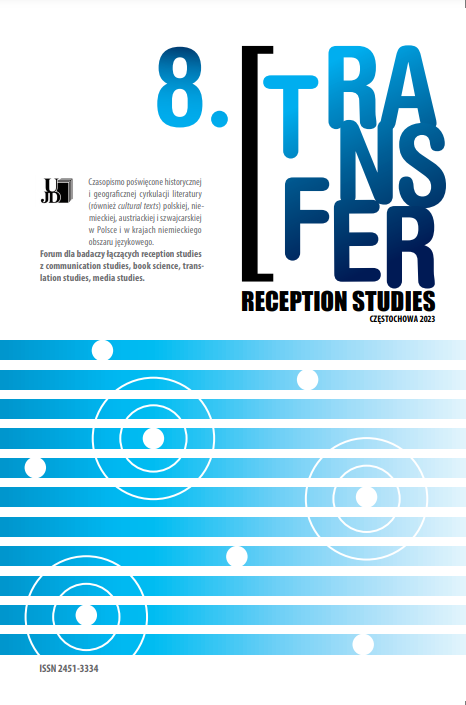Alexander Batowski's Criticism of the Polish Translation of Friedrich Schiller's Poem, Die Ideale
Abstract
The primary purpose of this article is to present a practical example of translation criticism through the use of Alexander Batowski's 1831 critique of Jan Nepomucen Kamiński's translation of Friedrich Schiller's poem, Die Ideale. The first part of the article discusses the differences between the 19th century's concept of translation and current trends; it also presents an introduction to the work of both a long-forgotten translator and his critic. Through analysis of Batowski's criticism, there is an attempt first of all to separate the critic's motivation, and then, to define the principles he uses to support his arguments. From this perspective, the article shows the way in which Batowski judges language and stylistic elements in Kamiński's translation. Through the article's historical approach to the problem of translation and translation criticism, it is possible to gain insight into the reception of Schiller's work in Poland in the 19th century.
Keywords:
Aleksander Batowski, Jan Nepomucen Kamiński, Friedrich Schiller, translation critique 19th century, literary translation 19th centuryReferences
References
Apel F., Kopetzki A., Literarische Übersetzung, J.B. Metzler, Stuttgart –Weimar 2003. Google Scholar
Ballady i pieśni Fryderyka Szyllera, übers. von J.N. Kamiński, K. Wild, Lwów 1820. Google Scholar
Batowski A., List do ś.p. Xa. Franciszka Siarczyńskiego z rozbiorem przekładu pieśni Szyllera: Die Ideale, „Czasopismo naukowe od Zakładu Narodowego imienia Ossolińskich wydawane“ 1831, H. 4, S. 64–66. Google Scholar
Batowski A., O Pieśni Szyllera (die Ideale) i o jej przekładzie, pióra Pana J.N. Kamińskiego, „Czasopismo naukowe od Zakładu Narodowego imienia Ossolińskich wydawane“ 1831, H. 4, S. 67–88. Google Scholar
Gedichte von Friedrich Schiller. Erster Theil, Ludwig Christian Kehr, Kreuznach 1804. Google Scholar
Jabłoński Z., Kamiński Jan Nepomucen Michał, [in:] Polski Słownik Biograficzny, Bd. 11, hrsg. von W. Konopczyński u.a., Zakład Narodowy im. Ossolińskich, Wrocław u.a. 1990, S. 563–566. Google Scholar
Kamiński J.N., Przekłady i ulotne wiersze, P. Piller, Lwów 1828. Google Scholar
Lasocka B., Kamiński Jan Nepomucen (1777–1855), [in:] Bibliografia Literatury Polskiej. Nowy Korbut, t. 5: Oświecenie: hasła osobowe I–O, hrsg. von E. Aleksandrowska u.a., PIW, Warszawa 1967, S. 52–65. Google Scholar
Lewicki K., Aleksander Konstanty Batowski (1799–1862). Historyk-wydawca. Bibliofil-kolekcjoner, „Roczniki Biblioteczne“ 1970, Jg. XIV, H. 1–2, S. 251–293. Google Scholar
Lewicki K., Batowski Aleksander, [in:] Polski Słownik Biograficzny, hrsg. von W. Konopczyński u. a., Zakład Narodowy im. Ossolińskich, Wrocław u.a. 1989, S. 354–355. Google Scholar
Linde S.B., Słownik języka polskiego, Bd. 1, Teil II: G–L, Drukarnia XX Piiarów, Warszawa 1808. Google Scholar
Musen-Almanach für das Jahr 1796, hrsg. von F. Schiller, Michaelis, Neustrelitz 1796. Google Scholar
Pietrusiński L., Jan Nepomucen Kamiński, [in:] K.W. Wójcicki, Życiorysy znakomitych ludzi wysławionych w różnych zawodach, J. Bernstein, Warszawa 1851, S. 349–371. Google Scholar
Reiß K., Möglichkeiten und Grenzen der Übersetzungskritik. Kategorien und Kriterien für eine sachgerechte Beurteilung von Übersetzungen, Max Hueber, München 1986. Google Scholar
Rulikowski M., Autobiografja J.N. Kamińskiego, „Ruch Literacki” 1926, H. 10, S. 299–301. Google Scholar
Szyller F., Ideały, aus dem Deutschen von J.N. Kamiński, „Pamiętnik Lwowski“ 1816, Bd. 2, S. 172–175. Google Scholar
Triller E., Batowski Aleksander Konstanty, [in:] Słownik pracowników książki polskiej, hrsg. von I. Treichel, PWN, Warszawa 1972, S. 43–44. Google Scholar
Trzynadlowski J., Zakład Narodowy imienia Ossolińskich 1817–1967. Zarys dziejów, Zakład Narodowy im. Ossolińskich, Wrocław u.a. 1967. Google Scholar
Vergil, Landbau, übers. von J.H. Voß, URL: http://gutenberg.spiegel.de/buch/landliche-gedichte-2622/8 [letzter Zugriff: 28.04.2017]. Google Scholar
Vergilius Maro P., Georgicon liber quartus, URL: http://www.thelatinlibrary.com/vergil/geo4.shtml [letzter Zugriff: 28.04.2017]. Google Scholar
Statistics
Abstract views: 56PDF downloads: 18
Similar Articles
- Justyna Radłowska, Bonifacy Miązek as a Historian of Poland’s Literature , Transfer. Reception Studies: Vol. 4 (2019)
- Joanna Drynda, Migration and family in the works of Anna Kim , Transfer. Reception Studies: Vol. 4 (2019)
- Brigitta Helbig-Mischewski, “Ich komme aus Polen”: Migrant Literature as Coming Out– Wir Strebermigranten by Emilia Smechowski in the Context of Polish Migrant Prose in Germany , Transfer. Reception Studies: Vol. 4 (2019)
- Bernhard HARTMANN, Poesie, Lyrik, Dichtung or Gedichte? - Keywords in Poetic and Metapoetic Writing Tadeusz Różewicz in German Translation , Transfer. Reception Studies: Vol. 2 (2017)
- Justyna Krauze-Pierz, "Where the idyll is greatest, there is also longing". The Polish internees in Switzerland and their longing for their homeland , Transfer. Reception Studies: Vol. 7 (2022)
- Agata Mirecka, Contemporary Drama and Theatre in German- -speaking Countries in a European Context. Report on the Project and the International Academic Conference Spaces of Humanity: Contemporary Drama and Theatre for a Sustainable Future – Spielräume des Humanen: Geg , Transfer. Reception Studies: Vol. 9 (2024): The Literature (of the) “now.” Interventions, Trends and Revisions
- Gabriela Jelitto-Piechulik, Longing for the past and its new discovery in reportages about Galicia , Transfer. Reception Studies: Vol. 7 (2022)
- Jürgen Eder, Literary Canon and Political Correctness. Perspectives of a conflict , Transfer. Reception Studies: Vol. 7 (2022)
- Jürgen Eder, Review: Jana Hrdličková, Zweiter Weltkrieg und Shoah in der deutschsprachigen hermetischen Lyrik nach 1945. Berlin: Frank & Timme GmbH. Verlag für wissenschaftliche Literatur, 2021, 346 S. , Transfer. Reception Studies: Vol. 6 (2021): AFFECTS 2 - CONTEMPORARY CULTURE OF EMOTIONS. TRANSFER. TRANSLATION. RECEPTION
- Dorota Sośnicka, Writing as an attempt to 'create beauty' and 'happiness’. Longing as a Central Theme in the Narratives of Urs Widmer , Transfer. Reception Studies: Vol. 7 (2022)
You may also start an advanced similarity search for this article.

